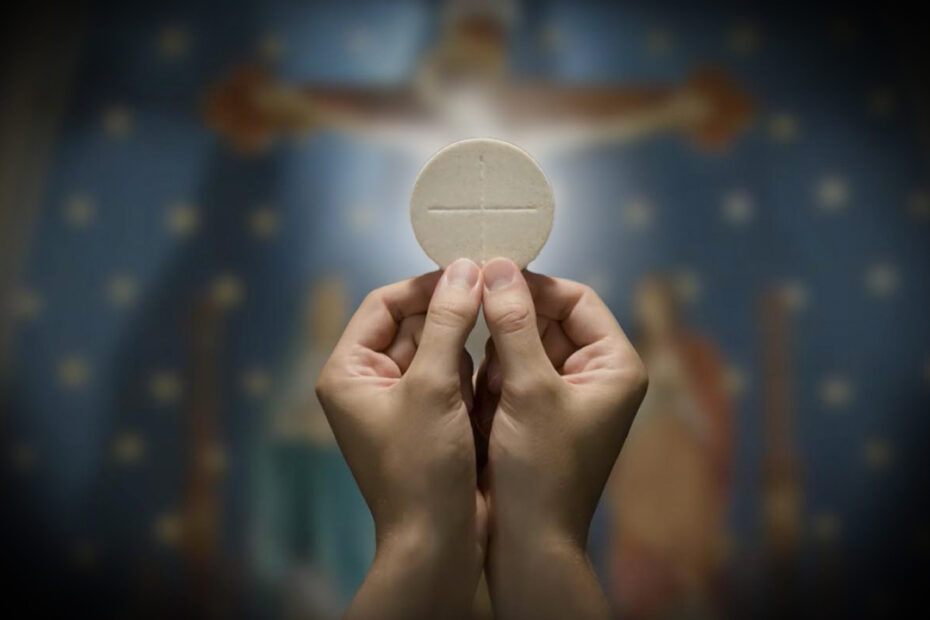By Judie Brown
Father James Buckley, FSSP, wrote extensively during his priestly life. One of his most remarkable commentaries was on the Holy Eucharist. Entitled “The Eucharist, the Greatest of the Sacraments,” he wrote,
Not only is the Eucharist a sacrifice; it is also a sacrament. Indeed, St. Thomas Aquinas calls it the greatest of the sacraments. Among the reasons the Angelic Doctor offers for this claim consider these two.
First, the Eucharist is the end or the goal of the other sacraments. It is manifest, as St. Thomas observes, that Holy Orders is directed to the consecration of the Eucharist and Baptism is directed to the reception of the Eucharist. One is perfected in Confirmation so that he does not through fear withdraw himself from the Eucharist. Through Penance and Extreme Unction one is prepared to receive the Eucharist worthily. It is by signifying the union of Christ and His Church that Matrimony represents the Eucharist which unites men to Christ.
Second, and more importantly, the Eucharist is the greatest of the sacraments because it contains the Body, Blood, Soul and Divinity of Jesus Christ. The other sacraments communicate sanctifying grace won by Christ on Calvary, but only the Eucharist is Christ Himself.
This reflection, which is a blessing to read in its entirety, confirms the foundational principle contained in the Church teaching regarding the real presence of Christ and our insight that the real presence of the preborn child prior to birth are closely linked. In the very way that we see Christ in the Eucharist with the eyes of faith, we see the preborn child in her mother with the eyes of comprehension of fundamental human biological development. Christ is truly present, as is the preborn child.
In its tribute to Fr. Buckley after his 2024 death, Catholic Voice wrote, “In his life as a priest, Father James Buckley preached and taught, administered sacraments, led parishes and schools, advised on boards and committees, founded a group for men, and became a nationally known media figure. In dying, he continued much of that work while facing his terminal cancer calmly, peacefully and matter-of-factly, finding meaning in his suffering.”
These words describe the faithful priest who, along with so many other talents, wanted his legacy to be remembered because of his devotion to the real presence of Christ. He told us this on many occasions as he guided us along the way to always adhering to truth, even when it was most unwelcome in the public eye. Many were my written comments Father Buckley modified with his clarity as he diligently reviewed our writings, especially as they pertained to Catholic teaching. We are grateful for that, for his wisdom, for his constant teaching, and for his dedication to the principles of Saint Ignatius of Loyola, which formulated the blueprint for the Ignatian retreats he led.
“This is My body.” These words of Christ at the Last Supper became the hallmark of Father Buckley’s priestly teaching as well. These words were the driving force behind our project designed to share with Catholics which elected officials were obedient to Canon 915 and which ones were not. Canon 915 is the Catholic Church law that defines who may not receive the body of Christ; it states, “Those who . . . [are] obstinately persevering in manifest grave sin are not to be admitted to holy communion.”
In life and now because of his priestly devotion to truth, we are able to continue the pro-life work to help our fellow Americans see with clarity the vivid relationship between the real presence of Christ and the real presence of the baby prior to birth. “This is my body” is for us the voice of Christ and the voice of the little one, who though not readily seen with the naked eye is very much present within her mother.
Thank you, Father Buckley. May your soul and the souls of all the faithful departed rest in peace. Amen.
